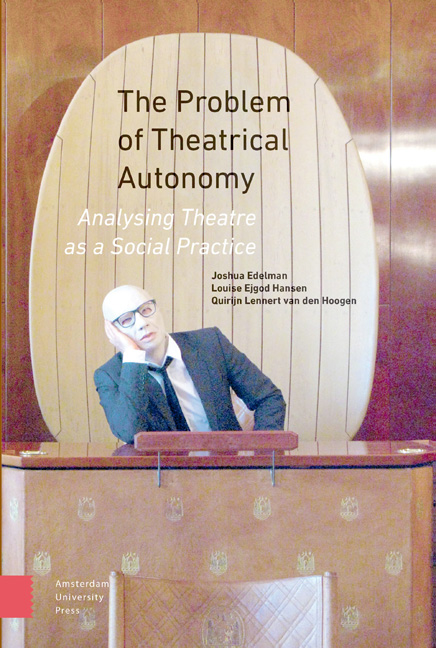Book contents
- Frontmatter
- Acknowledgements
- Contents
- List of Figures and Tables
- Introduction
- 1 How Can we Define Autonomy?
- 2 The Concept of Artistic Autonomy
- 3 Autonomy in the Contemporary Theatre
- 4 How Agents in Theatre Fields Make use of Claims to Autonomy
- 5 How Theatre Organization Shapes Claims to Autonomy
- 6 How Claims to Autonomy Serve those Outside Theatre Fields
- Conclusion
- References
- About the Authors
- Index
4 - How Agents in Theatre Fields Make use of Claims to Autonomy
Published online by Cambridge University Press: 12 February 2021
- Frontmatter
- Acknowledgements
- Contents
- List of Figures and Tables
- Introduction
- 1 How Can we Define Autonomy?
- 2 The Concept of Artistic Autonomy
- 3 Autonomy in the Contemporary Theatre
- 4 How Agents in Theatre Fields Make use of Claims to Autonomy
- 5 How Theatre Organization Shapes Claims to Autonomy
- 6 How Claims to Autonomy Serve those Outside Theatre Fields
- Conclusion
- References
- About the Authors
- Index
Summary
A central idea of this book is that claims to autonomy are important for the agents in theatre fields, but for a variety of reasons; autonomy is useful, but different agents will use it differently. This chapter is devoted to analysing how agents claim theatrical autonomy and to what ends. We begin this chapter with a closer look at how agents, through their claims to autonomy, can change the dynamics of a theatre field, including an examination of those agents who serve in the important and distinct role of consecrators. This also includes a look at agents who are not able to make a successful claim to autonomy because of the position they take within the field. As our examples will demonstrate, the dynamics of the field cannot be understood simply as a question of claiming as much autonomy as possible from a position that is as autonomous as possible. A successful claim to autonomy might also be made from the more heteronomous parts of the field. In the last section of the chapter, we analyse what agents in the theatre field gain by claiming autonomy. First, we analyse how their claims offer them possibilities inside the theatre field. This largely regards how agents position themselves (or take up new positions) within the field. But these possibilities are not limited to the theatre field itself. Claims to autonomy also make for possibilities to influence and interact with other fields—and thus other value systems—such as the political and economic field.
Claims to autonomy influence the shape of the theatre field
By their actions, agents can affect and thus change the dynamics of a theatre field. However, they cannot do so arbitrarily. As we argued in Chapter 1, we understand the theatre field as historically constructed and continuously reconstructed by the agents within it. In this section, we will examine how agents claim and thus use autonomy when positioning themselves within the theatre field.
Consecrating agents
A quite particular means by which some agents can change the theatre field's dynamics is the process of consecration. Such agents are able to influence the distribution of capitals between the agents in the field (and thus their ability to claim autonomy) by serving as gatekeepers, ensuring that uninitiated outsiders do not make specious claims to theatrical autonomy.
- Type
- Chapter
- Information
- The Problem of Theatrical AutonomyAnalysing Theatre as a Social Practice, pp. 97 - 126Publisher: Amsterdam University PressPrint publication year: 2016



